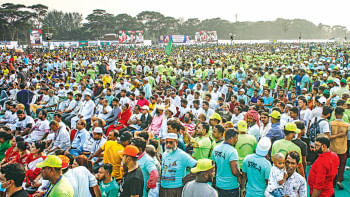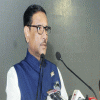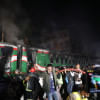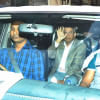‘Khela hobe’: Is our democracy our politicians’ plaything?

The Bangla phrase "Khela hobe," which roughly translates into "Game on" or "Bring it on," has become quite a public sensation of late. With the football World Cup in progress in Qatar, you would think the crazy fans of Argentina and Brazil were making wholesale use of the phrase to challenge and make fun of each other. Interestingly though, now that the political circuit has also significantly heated up ahead of the next general election due in about a year's time, the senior leaders of Awami League and BNP, the two biggest political parties in Bangladesh, are also telling each other to bring the game on to the field using the phrase "Khela hobe."
If my memory serves me well, "Khela hobe" was first used by Shamim Osman, the polarising lawmaker from Narayanganj, during a political standoff with his arch rival, Mayor Selina Hayat Ivy, several years ago. Even Mamata Banerjee, the chief minister of our neighbouring Indian state of West Bengal and yet another polarising political leader, has used this phrase to challenge her political rivals.
So, what do politicians really mean when they use phrases like "Game on"? If you look at history, especially in the last three decades or so, the rivalry between political parties has been far from being any kind of a game. Political standoffs in the past have often led to bloodshed, property damage, and loss of livelihoods. And every time it's the common people – more specifically those from the lower income groups – who have borne the biggest brunt. Most of those who died were poor, working-class people; most of the properties that were damaged belonged to the common people. And when the economy comes to a standstill due to blockades and shutdowns, it's the poor who suffer the most.
Therefore, when Awami League General Secretary Obaidul Quader asked his BNP counterpart Mirza Fakhrul Islam Alamgir to "bring it on," it raised alarm among the general people, whose opinions matter the least these days, yet they are the ones that are hit the hardest when political parties really "bring it on." So, if the two leading political parties really bring it on again before the next general election, can Bangladesh really afford yet another spate of violence, bloodshed and economic shutdown?

If you ask any ordinary person in this country, the answer would be a resounding no. They are already having a hard time dealing with the raging food and fuel price hikes, a volatile banking sector, and rampant corruption. These are only a few of the many factors that have significantly lowered the standard of living of the common people in Bangladesh, which has been made significantly worse by the pandemic at first, and then by Russia who also decided to bring it on against Ukraine.
The upcoming Dhaka divisional rally on December 10, announced two months ago by the BNP to create some hype among the grassroots party workers, started to look very much like the climax of the current phase of political activities. The BNP has held nine divisional rallies outside Dhaka and has managed to revive its grassroots to life after a long period of inactivity and slumber. The ruling Awami League has also practised restraint to a large extent so far and allowed their arch rival to stage the rallies as they liked – barring, of course, the enforced transport strikes, little to no mobile phone network coverage around the rally venues, and through the use of political cases.
However, the same cannot be said for the December 10 rally. BNP has already rejected Dhaka Metropolitan Police's (DMP) offer to hold their rally at Suhrawardy Udyan, which, although spacious and ideal for rallies, is tucked away from public sight. Therefore, holding a rally there does not serve BNP's purpose, because no matter how big a gathering the party manages to amass, nobody will be able to see it. Instead, they want to hold the rally in front of their party office in Naya Paltan, which is an extremely busy area, and hence the party will be able to stage a genuine show of organisational strength publicly. Quite understandably, the ruling Awami League doesn't want to give the BNP that chance and has promised to use law enforcement agencies to prevent them from gathering there.
This situation, therefore, presents the perfect recipe for a major unrest on the streets of Dhaka, which brings back scary memories from several years ago, giving a sense of déjà vu. It now seems as though that is the game Quader was referring to when he said, "Khela hobe."
Mohammad Al-Masum Molla is deputy chief reporter at The Daily Star.

 For all latest news, follow The Daily Star's Google News channel.
For all latest news, follow The Daily Star's Google News channel. 










Comments